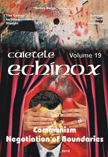Spuren der Grenze in Herta Müllers Diskurs des Alleinseins
Spuren der Grenze in Herta Müllers Diskurs des Alleinseins
Author(s): Mihaela RogozanSubject(s): Literary Texts
Published by: Universitatea Babeş-Bolyai
Keywords: Romanian Literature; Nobel Prize; Herta Müller; Communist Dictatorship; Boundaries; Homeland; Interculturality.
Summary/Abstract: This paper is an account of Herta Müller’s experience during the time of communist regime in Romania. The writer documented that experience in her essays and reiterates it as a central theme in the novels she wrote. For Herta Müller the term ”boundary” is not a simple word with a geographical meaning, but conotates the crippling effects of the communist dictatorship which are transffered in an aesthetic way of expression as in the foreign look and the discourse of loneliness. Herta Müller also passes across the boundary which separates the real dictator and the literary figure by using a striking metaphor: the king. Another instance of the boundary is occasioned by the writer’s own political situation, namely her statute of Heimatlosigkeit (homelessness). Finally, living between two languages (Romanian and German), Herta Müller confronted another boundary, a linguistic one, which encompasses her entire literary work.
Journal: Caietele Echinox
- Issue Year: 2010
- Issue No: 19
- Page Range: 250-258
- Page Count: 9
- Language: German
- Content File-PDF

